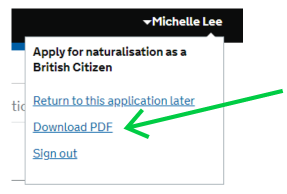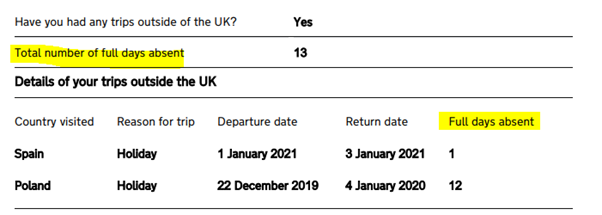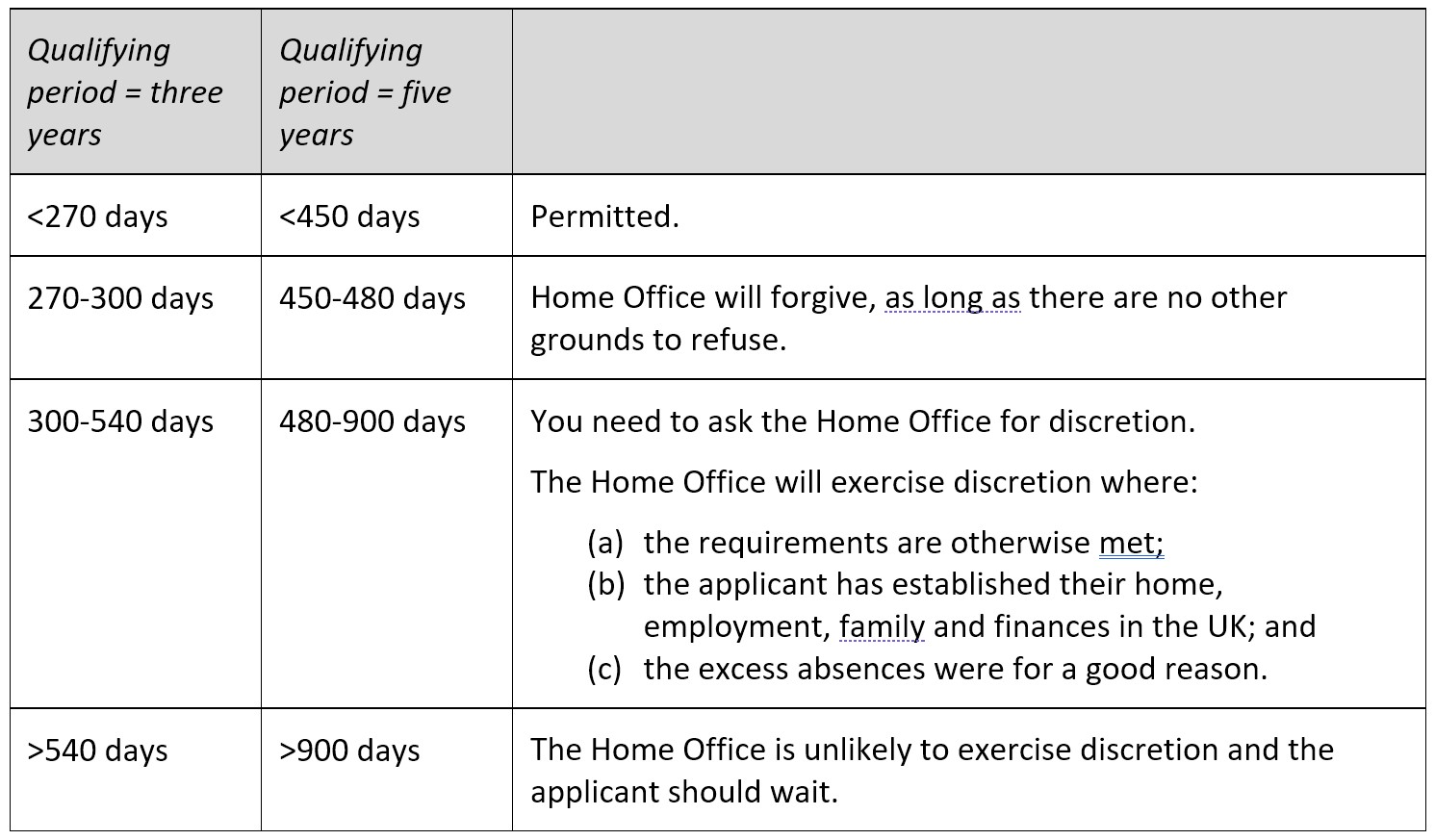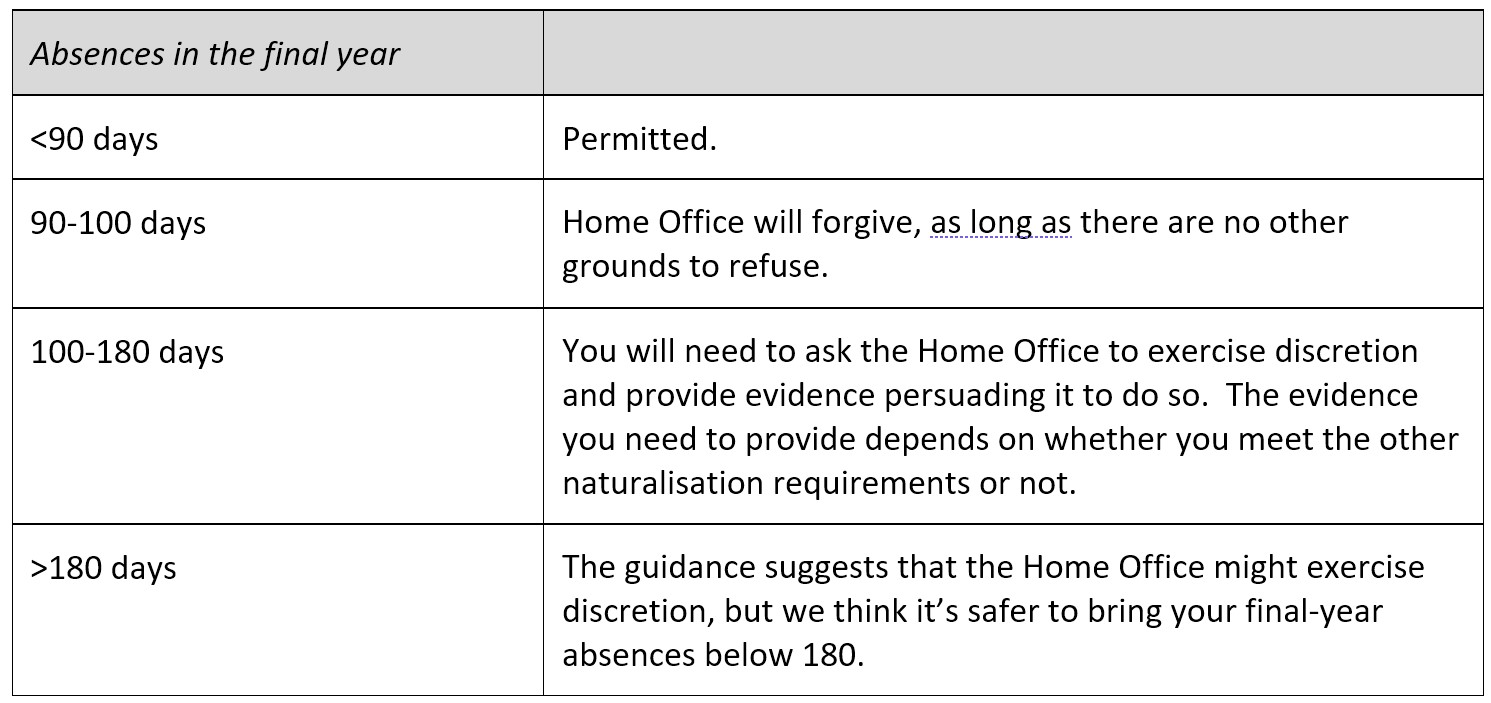Here at Truth Legal, our naturalisation clients come to us with a variety of different concerns. The two we see most often are the CSI problem, and excess absences from the UK.
There have been some important developments regarding the question of CSI lately – head over to our blog to find out more: Naturalisation and CSI: Where Are We Now?
Today I want to address the other most common concern for naturalisation applicants: excess absences from the UK.
Let’s start with something positive:
If you’re applying for British citizenship and have spent too many days outside the UK, there is still hope for a successful application. Read on for our top tips on how to get your British citizenship, even if you have excess absences and fall outside the absences thresholds.
As always, if you need to talk to someone about this or any other immigration concern, please get in touch with the Immigration team at Truth Legal today.
Absences: The Big Picture
Why do your absences even matter? Well, you’re trying to show that you intend to live in the UK permanently, and it doesn’t take much to make the Home Office suspicious. Spending too much time away in the years before you naturalise makes it that bit harder to convince the decision-maker that you’ve made the UK your home, and intend to live here permanently.
Absences: The Requirements
This gets tricky, but bear with me and I’ll try to simplify it as much as I can. It’s worth reading this section in full, and there’s also a summary table at the bottom for quick reference.
When looking at your absences, the Home Office will come at you from two angles: (1) your absences in the qualifying period; and (2) your absences in the final year.
(1) Absences in the Qualifying Period
The qualifying period is the time immediately before the date of your application.
If you’re married to a British citizen, your qualifying period is three years. For everyone else, it’s five years. Whichever is yours, keep that in your head as you read the rest of this section.
Up to 270 days, or up to 450 days
The starting point is: your absences in the qualifying period cannot exceed the following thresholds:
- 270 days for a qualifying period of three years; or
- 450 days for qualifying period of five years.
Time for tip number 1: travel days don’t count. Only full days spent outside the UK count towards your total absences, so the days when you physically departed from, or arrived in, the UK don’t count. For example, if you left the UK on 1st January and returned on 2nd January, it doesn’t count as an absence at all. If you left the UK on 1st January and returned on 3rd January, that would be one day of absence.
Sneaky tip number 2: there’s a way to get the application form to do the maths for you, although it’s a bit hidden. First, click through to the section titled “Trips outside the UK” – it’s quite far into the form. Enter all your actual arrival and departure dates and save that section. Then go to the top right corner, click on your name, and select “Download PDF”.
The PDF will look a bit like this:
Magic – the form has calculated your full days absent for each trip, and your total number of full days absent, as highlighted above. This little trick could save you some time and energy if you’ve been in and out of the UK a lot.
Look again at the above extract, especially my fictional trip to Spain. I said that I left the UK on 1st January and returned on 3rd January, and the form has automatically discounted my departure and arrival dates, leaving me with just one full day absent. It’s done the same for my holiday in Poland, if you want to count the days!
270-540 days, or 450-900 days
Back to the thresholds we talked about earlier. We know we’re ok up to 270-days-in-three-years or 450-days-in-five-years. What if we go higher than that?
You’ll still have options if:
- your qualifying period is three years and your total absences in that time are 540 days or less; or
- your qualifying period is five years and your total absences in that time are 900 days or less.
Why 540 and 900? We don’t know.
If you find yourself in this bracket, the Home Office can still grant your application where the excess absences were for a good reason. This is known as the Home Office ‘exercising discretion’. You should ask the Home Office expressly to exercise discretion, and you will need to persuade them to do so. Sounds scary, but read on.
Where and how do I persuade the Home Office? The way to do it is in a cover letter, also known as a “letter of representations”. We can write your cover letter for you, if you’ll forgive the shameless advertising, or you can DIY this bit. Here’s some suggestions as to the arguments you might make, or we might make on your behalf.
Home Office guidance states that, for the bracket we’re talking about, discretion on excess absences can be exercised if:
- the other application requirements are met;
- the applicant has established their home, employment, family and finances in the UK; and
- the excess absences were for a good reason, such as an unavoidable consequence of the nature of the applicant’s career, or inability to return to the UK due to global pandemic.
We think that last bit about a global pandemic is pretty new…
First thing to notice is the “and” at the end of point (b). That means all three of these things need to be true. Let’s consider each in some detail.
- the other application requirements are met
This seems quite straightforward, although we have spent some time overthinking the word ‘met’. Does that mean the rest of the requirements need to be met on a strict interpretation, i.e. without asking for discretion elsewhere?
For example, if you’re also asking the Home Office to exercise discretion by forgiving a problematic CSI period, does that mean you have met the other requirements, albeit with discretion? Or by asking the Home Office to forgive your CSI problem, are you impliedly acknowledging that you haven’t met the other requirements, but you’re asking the Home Office to overlook that?
Bottom line here: we probably need to get out a bit more, but aside from that, we’re a bit uncomfortable about fighting on two fronts. If you’re thinking about asking the Home Office for more than one discretion, you might want some legal advice.
Back to the list.
- the applicant has established their home, employment, family and finances in the UK
Most applicants easily meet this, but the risk is that you forget to prove it properly. Enter tip number 3: don’t neglect your evidence. The guidance says home-employment-family-finances, so take each of those things in turn and provide some evidence. You might already be providing some of this to meet other requirements.
Home: a tenancy agreement is good if you rent, or a mortgage statement or an Official Copy from the Land Registry if you own.
Employment: we like P60s and letter(s) from your employer(s) confirming that you’re working for them, or have worked for them. Payslips, P45s and employment contracts are good too.
Family: if you’re married to a Brit you’ll be asked all about them in the questions, and you’ll also be uploading your marriage certificate – ditto for civil partnerships. If you’re not married to a Brit you can drop a line or two into the cover letter about any family you have in the UK. Maybe you have a family member with their own immigration status? If so, it’s nice to upload a copy of their status and proof of your relationship to them.
Finances: bills and bank statements are usually the way to go, but don’t go overboard.
- the excess absences were for a good reason… etc etc
This can only really be addressed in a cover letter. We’d always recommend clearly identifying which of your absences were for what reason, and evidencing the reasons as much as possible.
Tip number 4: no need to provide good reasons for all of your absences. Remember you are allowed up to 270 days in three years or 450 days in five years whatever the reason. You only need to justify the days in excess of those limits.
So for example, if in your three-year qualifying period you spent 250 days overseas on holiday (lucky you) and 50 days away with work, that gives you a total of 300 days absent. You’re in the clear up to 270, so you just need to evidence that 30 of those work days were indeed for work.
For work-related absences, the best evidence is something from your employer confirming the reason for the trip. You might also have a work-trip itinerary or similar.
Lots of people are also dealing with covid-related absences. The exact phrasing in the Home Office guidance requires that “the applicant was unable to return to the UK because of global pandemic”. Because of the word “unable”, our favourite evidence is proof of flight cancellations, as this means you were physically unable to return to the UK even if you were at the airport with your suitcase.
That said, we know there’s plenty of grey areas here. What if the flights were running but you were afraid to return? What if you live alone in the UK and preferred to stay with family abroad? What if your UK employer advised you to stay overseas and work-from-home there?
We don’t have the answers to these questions, but we would hope for some leniency from the Home Office.
What we do know is that all of this should be addressed in the cover letter, whether we write it for you or you DIY.
More than 540 days, or more than 900 days
That covers absences up to 540-days-in-three-years or 900-days-in-five-years, but what if you’re even higher than that? Unfortunately, if your absences exceed these thresholds, it’s highly unlikely that your application will be successful. Your only real option is to wait until you can bring yourself closer to the thresholds.
That’s gone on a bit now, so here’s the summary table as promised:
(2) Absences in the Final Year
This is the second way the Home Office looks at absences. When we talk about the final year, we mean the year immediately before the date of your naturalisation application.
This is a bit simpler because the same rules apply to everyone, regardless of whether you’re married to a Brit or not, and regardless of whether your qualifying period is three or five years.
The starting point is this: you must have been outside the UK for no more than 90 days in the final year. Tip number 5: the Home Office will always grant applications with no more than 100 days of absence in the final year, as long as there are no other grounds to refuse.
And if you have absences greater than 100 days in your final year, again all hope is not lost. Like with absences in the qualifying period there’s another sliding scale.
100-180 days
The guidance here depends on whether or not you meet the other residence requirements for naturalisation.
If your final-year absences fall into this bracket, and you meet the other residence requirements, the Home Office will consider exercising discretion if you “demonstrate strong links through the presence of family, employment and [your] home in the UK”.
As we said above, it’s likely that most applicants for naturalisation will have strong links to the UK, but the risk is that you neglect to prove it.
Here, the guidance says family-employment-home, so again take each of those things in turn and provide some evidence. Our thoughts on the evidence that works are above.
If your final-year absences fall into this bracket and you don’t meet the other residence requirements, you must demonstrate that you:
- “have made this country [your] home by establishing a home, employment, family, property and finances in the UK” – again, please see above for our thoughts on the evidence that works; and
- “the absence is justified by Crown service or compelling occupational and compassionate reasons, including inability to travel because of a global pandemic”.
Your “compelling reasons” can be explained in a cover letter, and please see above for our suggested occupational and pandemic-related evidence.
If you cover both (a) and (b), the Home Office is likely to exercise discretion and forgive your excess absences. So far so good, but the position is more complicated if your final-year absences total…
More than 180 days
So far, it’s all been quite logical. As the total absent days have increased, so too has the evidence required to persuade the Home Office to exercise discretion. However, if your final-year absences exceed 180 days, things get a bit weird.
Again, the starting point is whether or not you meet the other residence requirements.
If your final-year absences fall into this bracket and you meet the other residence requirements, you need to demonstrate that you have made the UK your home.
Wait, what? Is that it? What happened to home-employment-family-finances?
We don’t know, but the conclusion we have drawn is that there must be some advantage to bringing your final-year absences below 180 days, or the Home Office wouldn’t have drawn a line at 180.
If your final-year absences fall into this bracket and you don’t meet the other residence requirements, you need to demonstrate that you have made the UK your home, and that there are exceptional circumstances. It’s not clear what is meant by exceptional circumstances, but we’d expect you could build a case around the pandemic.
All that said, we believe that it will normally be safer to wait until you can bring your final-year absences below 180 total days.
And that brings us neatly to our final tip, tip number 6: you always have the option to wait. Depending on the dates of your absences, it may be the case that, with every day that passes, you knock a day off your total absences. And with every day knocked off, your application gets that little bit safer and more likely to be successful.
Here’s the summary table for final-year absences.
Other Requirements for Naturalisation
While you’re here, take a look at the list below for the other naturalisation requirements:
- Residence: you must have been lawfully resident in the UK for five years, or three years if you are married to a British citizen. You must have indefinite leave to remain or settled status at the time of applying, and also for 12 months prior to the date of application if you are not married to a British citizen.
- Good character: if you have any history of criminality, immigration offending or bankruptcy, you should seek legal advice. Good character also includes the requirement not to have been in the UK in breach of immigration laws in the last ten years – see Louis’ CSI blog for more on how Europeans might accidentally have fallen foul of this requirement.
- English language: you can meet this with a degree taught in the UK or taught overseas in English, or you can take an English test.
- Life in the UK: you’ll need to pass the Life in the UK Test.
And if you need to talk to someone about excess absences, or any other immigration concern, please get in touch with the Immigration team at Truth Legal today.
Further Reading
From one of the UK’s most read legal blogs.














